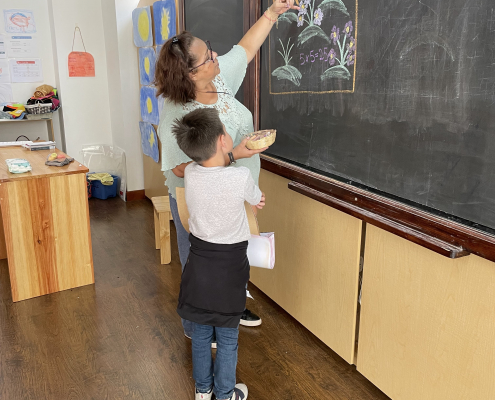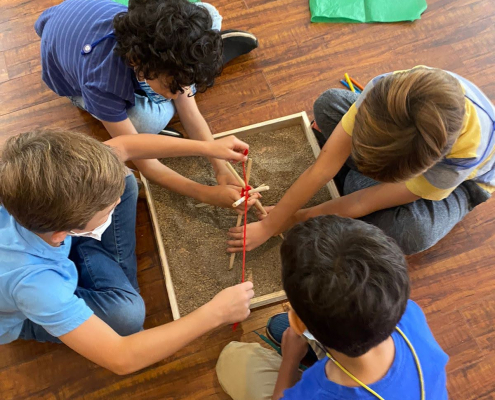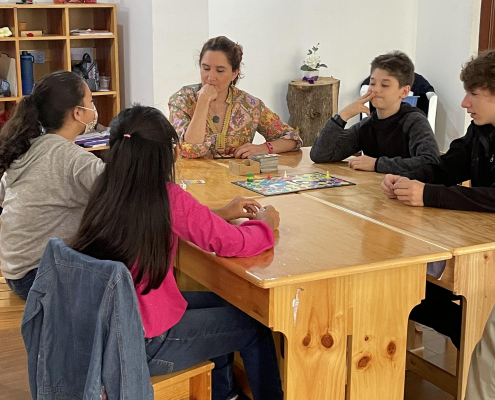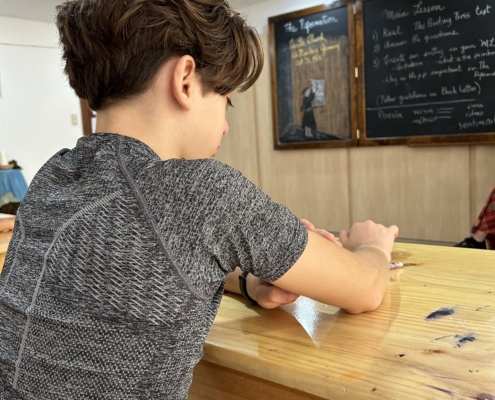The transition to High School implies a change of focus in the teacher’s activity. If in the previous period the soul of the young man had to be nourished by the class teacher, what will have to be awakened in High School is the thinking spirit. High School students not only expect their teachers to be experts in their respective field, but they need to know that teachers draw their own ideals from their work, from their lives.
Students do not expect the teacher to reveal the truth in an absolute sense, but they do expect the teacher to show them that the truth can be found. When they find that their teachers are continually deepening their understanding of their subject and of the nature of the human being, their own inner activity is encouraged, recognized, and stimulated.
Essentially, the Waldorf Curriculum is intended to support the healthy balanced development of the individual. The result of this process is to give them the tools to participate and contribute to society. The curriculum is not primarily driven by learning outcomes, which tend to be purely subject or skill oriented.
On the other hand, there is an intense willingness to commit to life, which also requires strong ideals for guidance. The ninth grade student seeks and accepts clarity in explanations, empathetic understanding from the adults around him and a lot of humor, with an open heart, a balm that softens and makes life’s inconsistencies bearable. The student’s situation when he enters the beginning of the Highschool can be summarized as follows:
- The awakening of a rigorous logic and thinking potential that requires distance from oneself and from others.
- The search for balance between intellectuality and the field of passion and impulsive will.
- The experience of how a higher ideal humanity emerges.
- The search for a new harmony with the world, which is not at the cost of losing personal identity and freedom recently discovered and still in the testing phase.
All too often, in today’s world, students graduate from high school and college unable to think for themselves. Their thinking, even when doing math, is largely imitative; they can do math problems as long as they have seen something similar before. As Waldorf educators, our goal is to have students graduate high school who can think flexibly, creatively, and independently. We want our students to be able to think for themselves, think analytically, and we hope that their thinking is heart-felt and imbued with imagination.
Certainly, one of the ultimate goals of any educational system should be that its graduates can think independently, flexibly and creatively. Yet, we often hear from university professors and people in industry hiring for entry-level engineering positions, that today’s education isn’t able to adequately produce graduates who are good problem-solvers and can think creatively.
9th Grade Benchmarks
By the end of the ninth grade, students should begin to:
- Show interest in the world around them, for their own motivation
- Acquire knowledge about what interests them
- Data collection of information and recording of the facts
- Acquire knowledge about what interests them
- Show structure in their thinking
- Be able to make logical causal deductions
- Transit from judgment based on feeling (8th grade) to judgment based on observation and understanding
- Apply analytical processes to a global nexus and discover the underlying principles
- Know how to make the transition from idea to ideal, and from ideal to practical application, and from discovery (grades seven and eight) to creation and invention
- Involve their will in the realm of ideals
- Appreciate technology as the “fifth kingdom”
- The kingdom of culture, created by human beings
- Discover in technology the thought that has become reality in the world
- The kingdom of culture, created by human beings
- Understand the transition between polarities in different areas of life and especially in the arts
- Understand that art and science reflect historical changes in cultural consciousness and that artists and scientists have world views that are expressed in their respective work
- Learn to work and be able to learn through work. Have direct experience of as many areas of practical life as possible
- Being able to work in a team and solve together the problems that come up.








